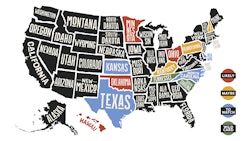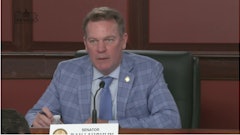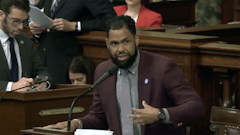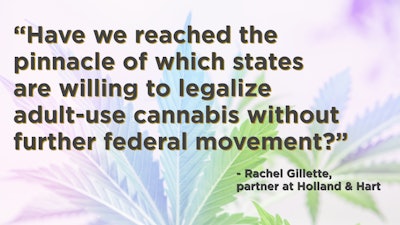
As the federal government continues to classify cannabis as a Schedule I controlled substance, individual states are reevaluating their cannabis policies yearly through ballot measures and legislation at the statehouse.
While Oklahoma voters recently rejected an adult-use cannabis legalization measure, legislatures in other states are considering medical and adult-use legalization bills that may be signed into law later this year.
Zachary Kobrin, a partner in Akerman’s Government Affairs and Public Policy and Cannabis groups, and Rachel Gillette, partner at Holland & Hart and leader of the firm’s Cannabis group, are encouraged by the momentum toward policy reform at the state level. However, they remain skeptical that states’ continued legalization efforts will urge the federal government to implement policy changes.
A Shift in Legalization Efforts
Two states that appear on the cusp of adult-use legalization this year are Hawaii, where the Senate approved a legalization bill March 7, and Delaware, where the House passed a pair of companion bills March 7 and March 9 to legalize cannabis for adult use.
As demonstrated by Hawaii and Delaware, lawmakers are increasingly taking up legalization rather than leaving the issue to citizen-initiated ballot measures.
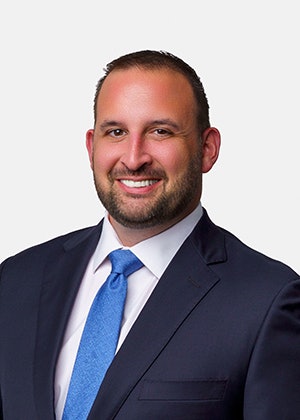
“Those two states are unique because it’s [an] indication that there’s not only broad support for legalization, but at the same time, you don’t necessarily need a referendum to get it done,” Kobrin says. “In the past, we’ve seen that some of the biggest wins have been through voter referendum.”
RELATED: 13 States That Could Legalize Cannabis in 2023
Gillette says that because every state doesn’t have an initiative process—and because naysayers can sometimes drive very successful opposition campaigns against cannabis ballot measures—she expects more states to legalize cannabis legislatively moving forward.
“There’s less likelihood for monkey wrenches to get thrown in in the process, especially when you have control with one party versus the other in a state legislative body,” she says. “It makes things easier to pass if you have the appropriate party-line votes that you can take.”
In Delaware’s case, Kobrin says legislators’ push for legalization reflects public opinion on cannabis policy.
“They have a Democratic House, Democratic Senate and a Democratic governor, but the governor still vetoed the legalization bill last year, in part, I think, because the governor knew they didn’t have a veto-proof majority,” he says. “This year, they came back, they have a strong majority, and they say they have enough [votes] to override a veto. It’s kind of like the Legislature is saying, ‘Hey, the people are speaking, this is what they want, and it could be really good.’”
Lawmakers could also be taking an increased interest in cannabis legalization because of its economic impacts, Kobrin says.
“It's interesting because so many people think about the public policy issues, but there’s a real economic question here,” he says. “You’re looking at states that are going to get anywhere from 7 percent to 20 percent excise tax on cannabis. That’s a lot of money. So, if you’re a small state like Hawaii or Delaware, that correlates to a pretty decent amount of tax revenue for the states.”
Defeat in Oklahoma
A March 7 special election called exclusively for the statewide question of adult-use cannabis legalization resulted in a resounding “no” from voters, who rejected State Question 820 in a 63-37 margin.
Kobrin and Gillette aren’t surprised that the measure failed to pass; both attorneys say that many of the states that have not yet legalized are the ones that have historically opposed cannabis policy reform and that may take more convincing before enacting medical or adult-use programs.
“I don’t think momentum is stalled by any stretch,” Kobrin says. “I think we’re also just getting to the point where … the states that are left at this point are states that you would expect to see opposition to a more adult-use or recreational economy or program.”
Gillette echoes this sentiment and wonders whether some states will simply refuse to legalize until federal prohibition lifts.

“Right now, we’re coming off pretty abysmal state initiatives, and this is the concern that I have: Have we reached the pinnacle of which states at this time are willing to legalize adult-use cannabis without further federal movement or support on the federal front?” Gillette asks. “There are certain states that simply won’t go there without knowing that the federal government is either going to stay out of the way or actually legalize it or deschedule it in some way in the near future.”
Looking more closely at Oklahoma, Kobrin says SQ 820 was largely “doomed from the beginning” with an organized opposition campaign and a special election, which resulted in low voter turnout.
Negative press about Oklahoma’s existing medical cannabis program could have also contributed to the defeat of the adult-use measure, Kobrin says.
“In the last 12 months, all residents in Oklahoma have seen in the news is negative press about cannabis,” he says. “We had the arrests there tied to organized crime, tied to human trafficking. We had the state putting a moratorium [on licensing] because they had too many cannabis businesses. All the state has seen in the last 12 or so months is negative press about the program there.”
The 2023 Outlook
Looking ahead, Kobrin is optimistic that Hawaii and Delaware will both get their adult-use legalization bills across the finish line this year, but he has some concerns about Delaware after the Senate passed a resolution March 9 that urges the federal government to support legislation to deschedule cannabis.
“[Lawmakers are] taking a position that Congress should do something about federal marijuana position, which tells me there’s probably not enough support in the Delaware Senate,” Kobrin says. “So, if that’s the case, I’m probably a little more optimistic on [Hawaii].”
Beyond Hawaii and Delaware, Kobrin says Minnesota, Ohio and Pennsylvania could legalize adult use, while North Carolina could set the stage for a medical cannabis program this year.
Adult-use legislation in Minnesota continues to gain momentum in St. Paul, clearing several House and Senate committees on its way to full floor votes.
In Ohio, the Legislature is considering an adult-use legalization bill while advocates push to get the issue in front of voters on the 2023 ballot.
Pennsylvania Gov. Josh Shapiro has called for adult-use cannabis legalization in his budget proposal, while lawmakers consider several bills in the statehouse to get the job done.
In North Carolina, the Senate passed a medical cannabis legalization bill in February that now heads to the House for consideration.
“Texas is another interesting one to watch,” Kobrin says. “The regulators there have a lot of bandwidth to expand the program, and while it is a hyper-low THC, pretty much a CBD program, it’s still, in my eyes, a medical program. So, Texas may be an interesting one to watch, too, just to see what kind of expansion the Department of Public Safety takes and what the appetite is from [elected officials].”
The attorneys are also keeping their eye on Kentucky, where Gov. Andy Beshear signed an executive order last year to allow patients that meet specific requirements to possess and consume small amounts of cannabis to treat qualifying medical conditions.
“I think it just depends on how much weight Gov. Beshear’s going to put behind it,” Kobrin says. “Is he going to put a legislative agenda together that will push [medical cannabis] forward or help get it on the ballot? I don’t know. Kentucky is one of those states [where] there’s such a diverse electorate … that, on the surface, you think it’s super conservative and may not be super in favor of it, but at the same time, I think you’ve got a very progressive governor that’s pushing hard for it.”
Kentucky lawmakers are currently considering a medical cannabis legalization bill, which moved to committee earlier this month.
With a presidential election on the horizon in 2024, Kobrin says any immediate reform efforts in state legislatures have the greatest chance of passing this year.
“Anything that’s going to get done is going to get done, from a legislative perspective, in '23,” he says. “I don’t see ’24 being a big legislative push year. I think in states like Minnesota and Ohio that are pushing for a legislative movement, they’re going to do it now.”
Federal Policy Reform
While the attorneys say that broad, comprehensive cannabis policy reform is unlikely at the federal level this year, they say the dichotomy between federal prohibition and state-level legalization can’t last forever.
Gillette says that more states legalizing cannabis could put pressure on the federal government to loosen its restrictions on the plant, but as more states reject legalization proposals, the opposite could be true.
“In some respects, it could put pressure on the federal government to actually do something,” she says. “But in other respects, it could allow the federal government to sit back and say, ‘Well, OK, I guess there are no more states that want to legalize cannabis.’ But we have almost every state that has a medical program in some form or fashion. In some respects, it’s still a situation where the federal government looks a little silly where they’re talking out both sides of their mouth when they continue to take the position that cannabis has no medical efficacy and it’s a Schedule I controlled substance. So, something has to happen. The federal government has to do something.”
On the other hand, Kobrin isn’t sure that more states legalizing cannabis will force the federal government to act on the issue.
“I don’t see how Minnesota flipping or North Carolina going or Kentucky going—I just don’t see how that’s going to move the federal government along,” Kobrin says. “I think, right now, there are bigger issues on the federal level. You’ve got a divided Congress and a House that’s divided even more. I think the likelihood of them taking any action on cannabis reform is very tough. … I think there’s room for incremental reform.”
That incremental policy reform could take shape as a tax bill aimed at eliminating 280E, for example, or as additional legislation aimed at medical cannabis research or veteran access, Kobrin says.
In the meantime, he says industry stakeholders must come to a consensus on what federal policy changes should look like.
“Most members of Congress, if you were to ask them about it, they would say get the industry on the same page to put together a clear proposal,” Kobrin says. “[President Joe] Biden came out last year and made the comments about how he wants the study into rescheduling or descheduling. If you were to ask five people who work in the industry whether they prefer rescheduling or descheduling, you’d probably get five different answers. If the industry can’t get behind one movement, one initiative, then how can we expect Congress to do anything?”
RELATED: To Reschedule or Deschedule? Plant-Touching Businesses Weigh In
In addition, Kobrin says restrictions that prohibit U.S.-based cannabis businesses from listing on major stock exchanges like the New York Stock Exchange (NYSE) and Nasdaq are one of the largest hindrances for operators in the industry, and he would like to see legislation passed to make the exchanges more comfortable with the space.
Kobrin believes if the NYSE and Nasdaq begin listing cannabis companies, then larger companies like Coca Cola would segue into the cannabis space.
Whatever the best path forward, Gillette says federal policy reform is urgently needed to help cannabis businesses and consumers alike.
“You have the federal government incentivizing the black market by continuing to have these punitive federal policies that are really impactful and thereby keeping people essentially incentivized to be in the [illicit] market, even in legal states where it’s legal under both medical and adult use,” she says. “And then you have people engaging in risky behavior because if cannabis isn’t legal in Idaho, [for example], that doesn’t mean nobody smokes cannabis in Idaho. … So, people are getting arrested in Idaho for selling and distributing and consuming cannabis. And that’s just unfortunate. It doesn’t make any sense to me.”
Gillette says time is of the essence to enact federal reform.
“The thing that people have to remember, too, is with changing administrations comes changing enforcement priorities and policies,” she says. “So, it’s really important that there is something that goes on as far as removing it from a Schedule I controlled substance."
Join us this year at the Paris Las Vegas Hotel & Casino for Cannabis Conference, the leading education and expo event for plant-touching businesses.











